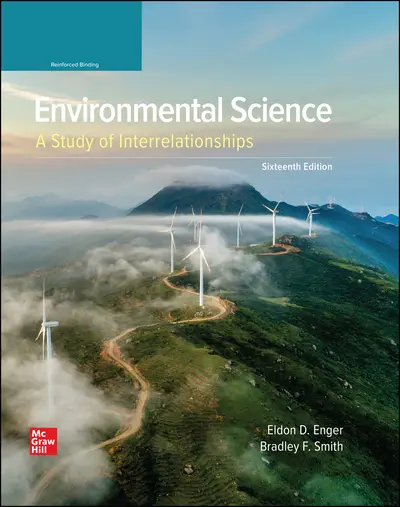Eldon D. Enger is an emeritus professor of biology at Delta College, a community college near Saginaw, Michigan. He received his B.A. and M.S. degrees from the University of Michigan. Professor Enger has over 30 years of teaching experience, during which he has taught biology, zoology, environmental science, and several other courses. He has been very active in curriculum and course development. A major curriculum contribution was the development of an environmental technician curriculum and the courses that support it. He was also involved in the development of learning community courses in stream ecology, winter ecology, and plant identification. Each of these courses involved students in weekend-long experiences in the outdoors that paired environmental education with physical activity—stream ecology and canoeing, winter ecology and cross-country skiing, and plant identification with backpacking.
Professor Enger is an advocate for variety in teaching methodology. He feels that if students are provided with varied experiences, they are more likely to learn. In addition to the standard textbook assignments, lectures, and laboratory activities, his classes included writing assignments, student presentation of lecture material, debates by students on controversial issues, field experiences, individual student projects, and discussions of local examples and relevant current events. Textbooks are very valuable for presenting content, especially if they contain accurate, informative drawings and visual examples. Lectures are best used to help students see themes and make connections, and laboratory activities provide important hands-on activities.
Professor Enger received the Bergstein Award for Teaching Excellence and the Scholarly Achievement Award from Delta College and was selected as a Fulbright Exchange Teacher twice—to Australia and Scotland. He has participated as a volunteer in several Earthwatch Research Programs. These include studying the behavior of a bird known as the long-tailed manakin in Costa Rica, participating in a study to assess the possibility of reintroducing endangered marsupials from offshore islands to mainland Australia, helping with efforts to protect the nesting beaches of the leatherback turtle in Costa Rica, and assisting with ongoing research on the sustainable use of fish, wildlife, and forest resources in the Amazon Basin in Peru. He also participated in a People to People program, which involved an exchange of ideas between U.S. and South African environmental professionals.
He has traveled extensively, which has allowed him first-hand experience with coral reefs, ocean coasts, savannas, mangrove swamps, tundra, prairies, tropical rainforests, cloud forests, deserts, temperate rainforests, coniferous forests, deciduous forests, and many other special ecosystems. These experiences have provided opportunities to observe the causes and consequences of many environmental problems from a broad social and scientific perspective.
He volunteers at a local nature center, land conservancy, and Habitat for Humanity affiliate. Since 2005, he and his wife have spent a month each year with other volunteers from their church repairing houses damaged by tornados, floods, and hurricanes throughout the United States.
Professor Enger and his wife Judy have two married sons and four grandchildren. He enjoys a variety of outdoor pursuits such as cross-country skiing, snowshoeing, hiking, kayaking, hunting, fishing, camping, and gardening. Other interests include reading a wide variety of periodicals, beekeeping, singing in a church choir, picking wild berries, and preserving garden produce.
Bradley F. Smith is the Dean Emeritus of Western Washington University in Bellingham, Washington, having served as Dean from 1994 to 2012. Prior to assuming the position as Dean in 1994, he served as the first Director of the Office of Environmental Education for the U.S. Environmental Protection Agency in Washington, D.C., from 1991 to 1994. Dean Smith also served as the Acting President of the National Environmental Education and Training Foundation in Washington, D.C., and as a Special Assistant to the EPA Administrator.
Before moving to Washington, D.C., Dean Smith was a professor of political science and environmental studies for 15 years and the executive director of an environmental education center and nature refuge for five years.
Dean Smith has considerable international experience. He was a Fulbright Exchange Teacher to England and worked as a research associate for Environment Canada in New Brunswick. He is a frequent speaker on environmental issues worldwide and serves on the International Scholars Program for the U.S. Information Agency. He also served as a U.S. representative on the Tri-Lateral Commission on environmental education with Canada and Mexico. He was awarded a NATO Fellowship to study the environmental problems associated with the closure of former Soviet military bases in Eastern Europe. He is a Fellow of the Royal Institute of Environmental Science in the U.K.
Smith is a commissioner of the Washington State Fish and Wildlife Commission (served as chair from 2015–2020). He is the chair of the board of trustees for Bellingham Technical College (BTC). BTC operates a fish hatchery as part of their aquaculture program that produces 5 million salmon a year for Puget Sound. Dean Smith is a member of the Governors Orca Whale Task Force. He also serves on the North Pacific Research Board, the Bering Sea Fisheries Advisory Board, and on the board of the Washington Sea Grant. Previously, he served as chair of the Washington State Sustainability Council, as president of the Council of Environmental Deans and Directors, as a Trustee of the National Envi-ronmental Education Foundation, and as a member of the National Advisory Council for Environmental Policy and Technology for the USEPA. He also served on President Bill Clinton’s council for Sustainable Development (Education Task Force). From 2004 to 2013, he served on the Steering Committee of the Commission for Education and Communication for the International Union for the Conservation of Nature (IUCN) in Gland, Switzerland.
Dean Smith holds a Ph.D. from the School of Natural Resources and the Environment at the University of Michigan.
Dean Smith and his wife, Daria, live along the shores of Puget Sound in Bellingham, Washington, and spend part of the summer at their summer home on the shores of Lake Huron in the Upper Peninsula of Michigan. He has two married grown children and two grandchildren and is an avid outdoor enthusiast.
